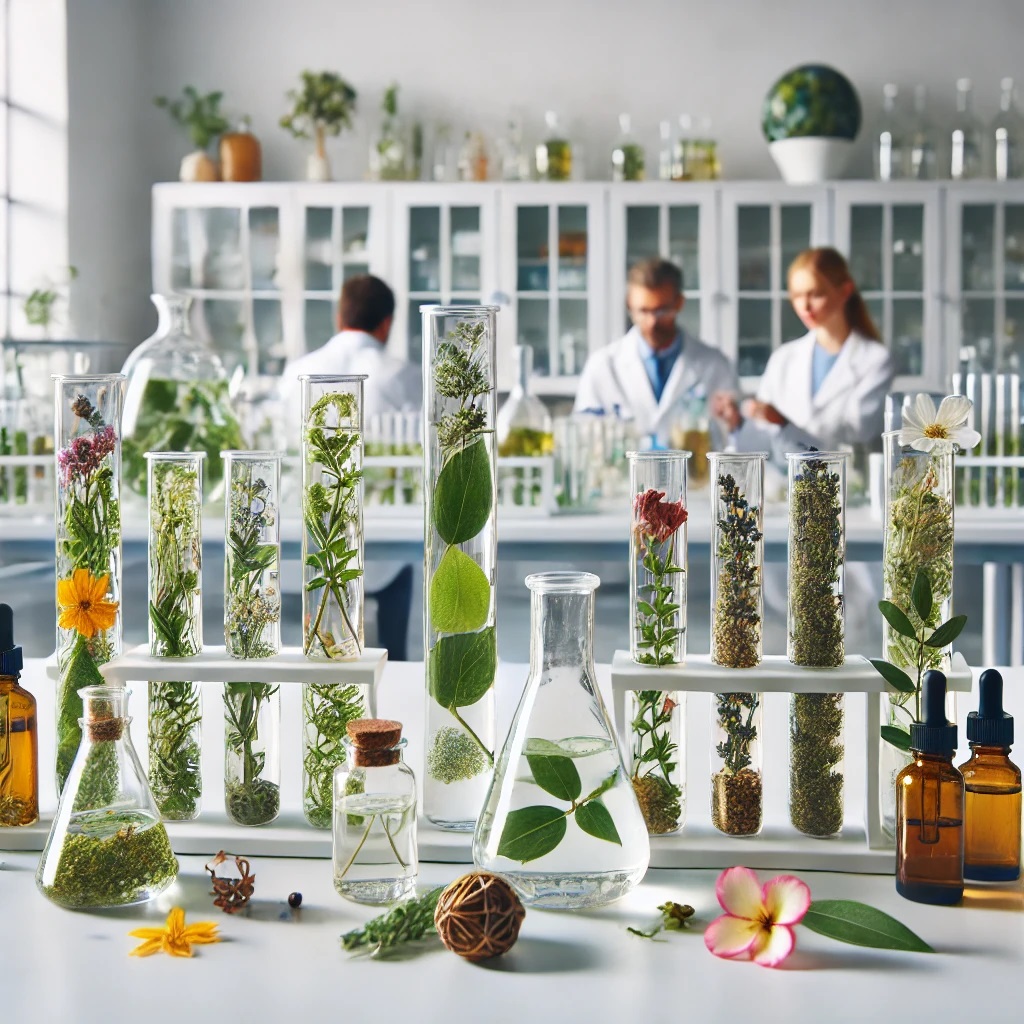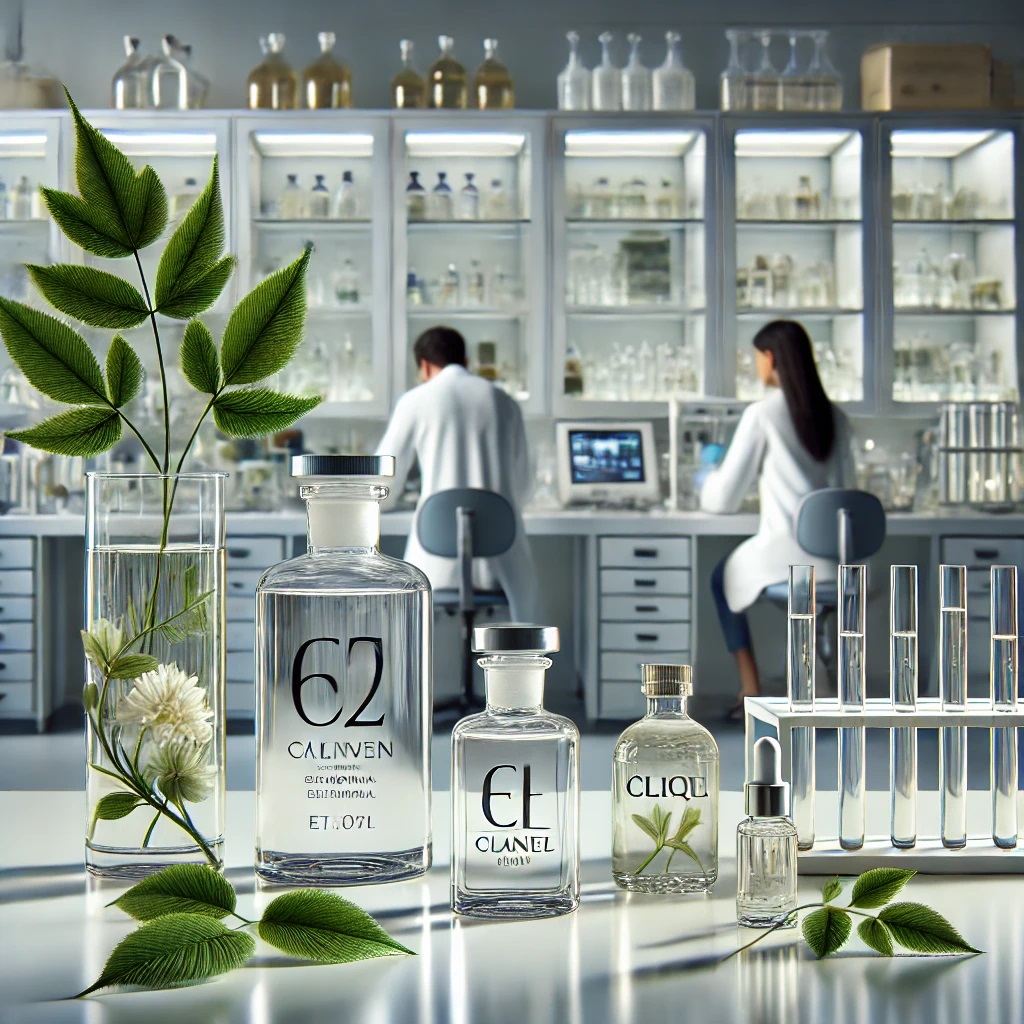Ethanol: Basic Information
Ethanol, also known as ethyl alcohol, is a volatile, flammable alcohol that is commonly used in a variety of cosmetic and beauty products. It is known for its ability to evaporate quickly, making it useful in products that require rapid drying. Ethanol serves as a solvent, preservative, and antimicrobial agent in many formulations. It is also a common ingredient in sanitizers, toners, perfumes, and other personal care products because of its antibacterial properties and effectiveness in dissolving various ingredients.
Is Ethanol a Harmful Element?
Ethanol is generally safe for use in cosmetics when used at appropriate concentrations. However, there are a few considerations regarding its use:
- Drying Effects: Ethanol can be drying to the skin, particularly when used in high concentrations, as it can strip away the skin’s natural oils. This is why it is often combined with moisturizing ingredients in skincare products to counterbalance its drying effects.
- Sensitive Skin: People with sensitive skin or certain skin conditions (e.g., eczema, rosacea) may find ethanol irritating. In such cases, ethanol-free products or those with low ethanol content may be more suitable.
- Not Harmful in Regulated Use: Ethanol is widely regulated by cosmetic safety bodies, including the FDA and EU regulators. When used at appropriate levels in personal care products, ethanol does not pose a significant health risk. However, excessive exposure or inhalation of ethanol from sprays or hand sanitizers should be avoided.
- Not for Long-Term Use on Damaged Skin: Continuous use of ethanol-based products on damaged or sensitive skin can worsen irritation. In cases of dry or compromised skin, ethanol-free alternatives might be preferred.
Despite these considerations, ethanol is approved for use by major cosmetic safety regulatory bodies and is widely used in products with no serious health risks when used properly.
Healthy and Well-being Improvements Provided by Ethanol
- Bacterial Protection: Ethanol’s antibacterial properties are highly effective in killing harmful bacteria and viruses on the skin, promoting hygiene and reducing the risk of infections.
- Quick Absorption: Ethanol enhances the penetration of other beneficial ingredients, such as vitamins and antioxidants, helping products work more effectively on the skin.
- Refreshing and Cooling: Ethanol’s rapid evaporation provides a cooling effect on the skin, which is especially useful in products like toners, aftershaves, and cooling gels. This makes the skin feel refreshed and rejuvenated.
- Oil Control: For people with oily or acne-prone skin, ethanol helps reduce excess oil production, leading to clearer and less shiny skin over time.
- Convenience: Ethanol allows for the formulation of quick-drying, non-greasy products like hand sanitizers, deodorants, and hair sprays, which contribute to overall personal grooming and hygiene.
Detailed Benefits of Ethanol
- Solvent for Ingredients: Ethanol is used to dissolve and mix various ingredients in cosmetic products, especially those that are not easily soluble in water. It allows for uniform distribution of ingredients like fragrances, essential oils, and botanical extracts. In perfumes, ethanol helps carry and disperse the scent molecules efficiently.
- Antimicrobial and Antibacterial Properties: Ethanol’s ability to kill bacteria and other microorganisms is one of its most significant benefits. It is the main active ingredient in hand sanitizers, where it effectively eliminates germs. This property is also beneficial in acne treatments, as ethanol helps reduce bacteria on the skin, contributing to fewer breakouts.
- Quick-Drying and Non-Greasy: Ethanol evaporates quickly when applied to the skin, leaving a light, non-greasy feel. This makes it ideal for products like facial toners, hand sanitizers, and deodorants, where quick drying is important for comfort and usability. In hair sprays, ethanol helps create a fine mist that dries quickly, holding hairstyles in place without feeling sticky or heavy.
- Enhances Product Penetration: Ethanol acts as a penetration enhancer in many skincare formulations. It helps active ingredients like salicylic acid, retinol, or vitamin C penetrate deeper into the skin, making the products more effective. This is particularly useful in serums and treatments for acne, hyperpigmentation, and anti-aging.
- Astringent and Oil Control: Ethanol has natural astringent properties, which help tighten the skin and reduce oil production. It is commonly used in toners and acne treatments to shrink the appearance of pores and control excess sebum. This is particularly beneficial for people with oily or acne-prone skin.
- Cooling Effect: As ethanol evaporates, it leaves a cooling sensation on the skin, making it a key ingredient in aftershaves, toners, and cooling gels. This effect is soothing and refreshing, especially after shaving or during warm weather.

Beauty Products Made with Ethanol
- Toners:
- Clinique Clarifying Lotion: Ethanol is used to cleanse the skin and remove excess oil and impurities, particularly for oily and combination skin types.
- Neutrogena Pore Refining Toner: Contains ethanol to help tighten pores and reduce shine on the skin.
- Hand Sanitizers:
- Purell Hand Sanitizer: Ethanol is the active ingredient in this popular hand sanitizer, known for killing germs and bacteria.
- Bath & Body Works Hand Sanitizer: Ethanol is used to provide quick sanitization with a pleasant scent.
- Acne Treatments:
- Mario Badescu Drying Lotion: Uses ethanol to dry out pimples and prevent further bacterial growth.
- Clean & Clear Advantage Acne Spot Treatment: Contains ethanol to help fight acne and reduce oil production.
- Deodorants:
- Dove Go Fresh Antiperspirant Spray: Ethanol is used as a base to help the product dry quickly and kill odor-causing bacteria.
- Nivea Dry Comfort Deodorant: Contains ethanol to provide quick-drying protection and help control perspiration.
- Perfumes and Fragrances:
- Chanel No. 5: Ethanol is the primary solvent used in most perfumes to dissolve the fragrance oils and help them evaporate quickly upon application.
- Dior J’adore: Ethanol is used to carry and release the scent effectively.
- Aftershaves:
- Aqua Velva Classic Ice Blue: Contains ethanol to provide a cooling, refreshing sensation and disinfect the skin after shaving.
- Old Spice Classic Aftershave: Ethanol is used to soothe the skin and close pores post-shave.
- Hair Sprays:
- L’Oréal Paris Elnett Satin Hair Spray: Ethanol is the solvent that allows for a lightweight spray that holds hair in place without stickiness.
- TRESemmé Freeze Hold Hair Spray: Contains ethanol to ensure fast-drying application with long-lasting hold.
Other Uses for Ethanol
- Disinfectants: Ethanol is used in various cleaning products and disinfectants for surfaces and equipment due to its effectiveness in killing germs, bacteria, and viruses.
- Pharmaceuticals: Ethanol is often used as a solvent or preservative in medications, especially in liquid formulations such as cough syrups and tinctures.
- Beverages: Ethanol is the primary alcohol in alcoholic beverages like beer, wine, and spirits. It is produced through fermentation and is the component that causes intoxication when consumed in large quantities.
- Fuel and Energy: Ethanol is used as a biofuel in gasoline blends (like E85) due to its clean-burning properties, which help reduce carbon emissions.
- Antiseptic Wipes: Ethanol is used in antiseptic wipes and swabs, commonly used in medical settings to disinfect the skin before injections or surgeries.

List of product brands that contain ethanol:
Bath & Body Works
- PocketBac Hand Sanitizer: Ethanol is used for its germ-killing properties.
Banana Boat
- Sport Performance CoolZone Spray Sunscreen SPF 30: Ethanol is used for quick-drying and lightweight sun protection.
Calvin Klein
- CK One Eau de Toilette: Ethanol serves as the solvent to release the fragrance.
Chanel
- Chanel No. 5 Eau de Parfum: Ethanol is used to disperse the fragrance oils.
Clean & Clear
- Advantage Acne Spot Treatment: Contains ethanol to help dry and clear acne.
Clinique
- Clarifying Lotion: Ethanol is included to cleanse the skin, reduce oil, and tighten pores.
Coppertone
- Sport Continuous Spray Sunscreen SPF 50: Ethanol is included for fast absorption and non-greasy sun protection.
Degree
- Men Dry Spray Antiperspirant: Ethanol helps control sweat and odor while providing a quick-drying formula.
Dettol
- Hand Sanitizer: Ethanol is the main ingredient for antibacterial protection.
Dior
- J’adore Eau de Parfum: Ethanol helps release and enhance the fragrance.
Dove
- Go Fresh Antiperspirant Spray: Contains ethanol for quick-drying and bacterial control.
Garnier
- SkinActive Micellar Cleansing Water: Ethanol is used to help remove makeup and clean impurities.
Germ-X
- Hand Sanitizer: Ethanol is used as the active ingredient for antimicrobial protection.
La Roche-Posay
- Effaclar Astringent Toner: Ethanol is used to mattify oily skin and reduce pores.
L’Oréal Paris
- Elnett Satin Hair Spray: Ethanol serves as the solvent that helps the spray dry quickly and hold hairstyles.
- Pure-Clay Mask: Uses ethanol in some versions to enhance absorption of active ingredients.
MAC
- Prep + Prime Fix+: Ethanol helps the spray dry quickly and set makeup without leaving a sticky feel.
Mario Badescu
- Drying Lotion: Ethanol is used to dry out pimples and control excess oil.
Neutrogena
- Pore Refining Toner: Contains ethanol to help reduce the appearance of pores and oil.
- Rapid Clear Acne Eliminating Spot Gel: Ethanol helps deliver the active ingredients for clearer skin.
- Ultra Sheer Body Mist Sunscreen SPF 50: Uses ethanol to help the sunscreen dry quickly on the skin.
Nivea
- Dry Comfort Antiperspirant Spray: Ethanol helps the product dry quickly and reduce sweat.
Old Spice
- Classic Aftershave: Ethanol is used for its cooling and antiseptic properties.
- Antiperspirant Spray: Ethanol helps provide a quick-drying formula that reduces odor and sweat.
Proraso
- After Shave Lotion: Contains ethanol to soothe the skin and disinfect after shaving.
Purell
- Advanced Hand Sanitizer: Ethanol is the primary germ-killing ingredient.
Simple
- Kind to Skin Micellar Cleansing Water: Ethanol helps dissolve makeup and cleanse impurities.
Tatcha
- The Clarifying Clay Mask: Some versions use ethanol to improve ingredient penetration and efficacy.
Tom Ford
- Black Orchid Eau de Parfum: Ethanol serves as the solvent that disperses the fragrance oils.
TRESemmé
- Compressed Micro Mist Hair Spray: Ethanol is used to help the spray dry quickly and provide a long-lasting hold.
Urban Decay
- All Nighter Setting Spray: Ethanol helps set makeup quickly, ensuring long-lasting wear.
Thayers
- Witch Hazel Astringent: Some versions contain ethanol to help control oil and tone the skin.
Aussie
· Instant Freeze Hair Spray: Ethanol is used to provide a strong, quick-drying hold.
Conclusion
Ethanol is a widely used ingredient in cosmetics and personal care products due to its versatility as a solvent, antimicrobial agent, and quick-drying component. It is commonly found in toners, hand sanitizers, perfumes, deodorants, and acne treatments. When used properly and in regulated amounts, ethanol is safe and provides numerous benefits, such as improving product absorption, controlling oil, and killing bacteria.
However, ethanol can have drying effects, especially for those with sensitive or dry skin, so it is important to choose products that balance ethanol with hydrating ingredients. Beyond cosmetics, ethanol has a wide range of applications, from disinfectants and pharmaceuticals to biofuels and alcoholic beverages, making it a key element in both beauty and industrial sectors.














